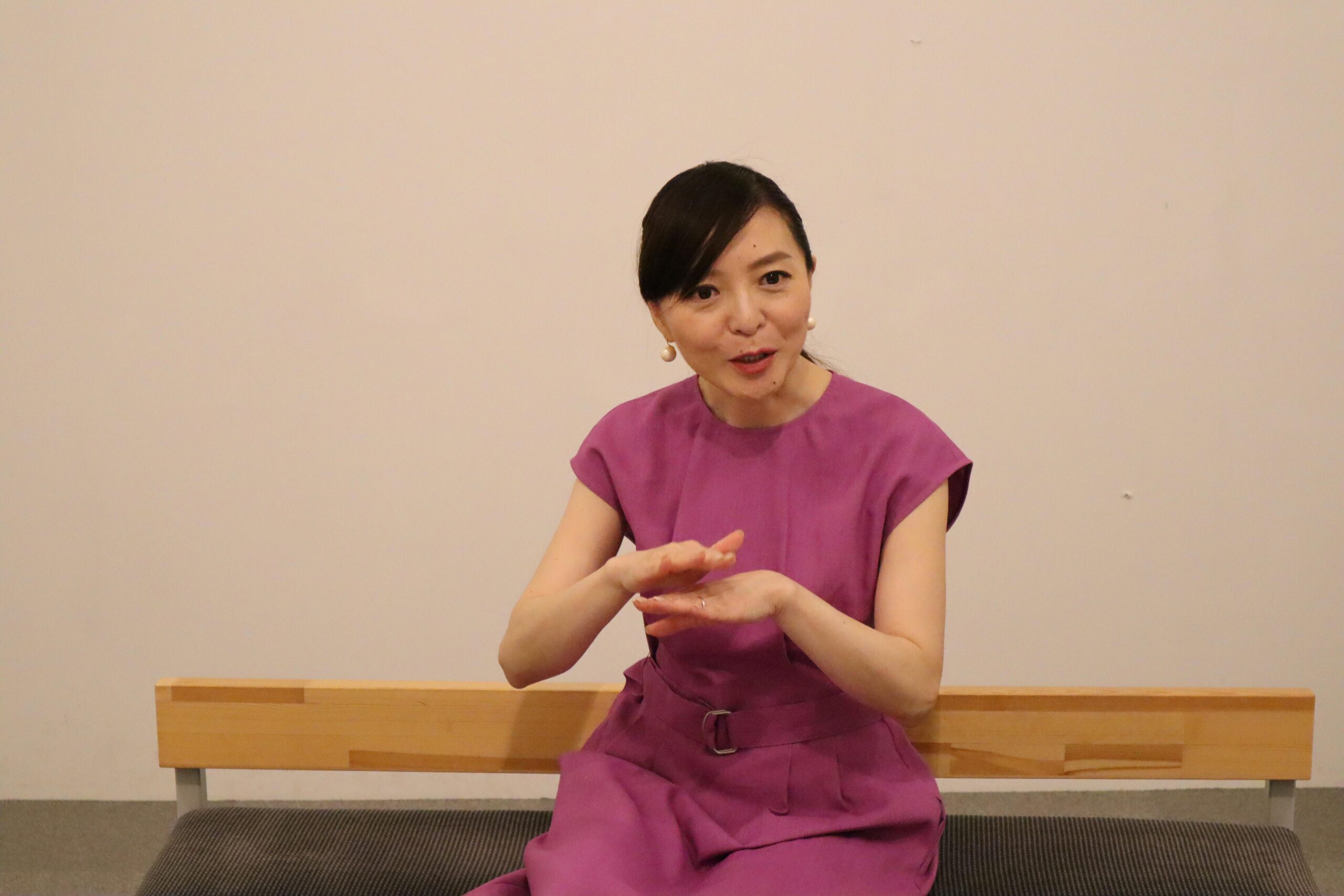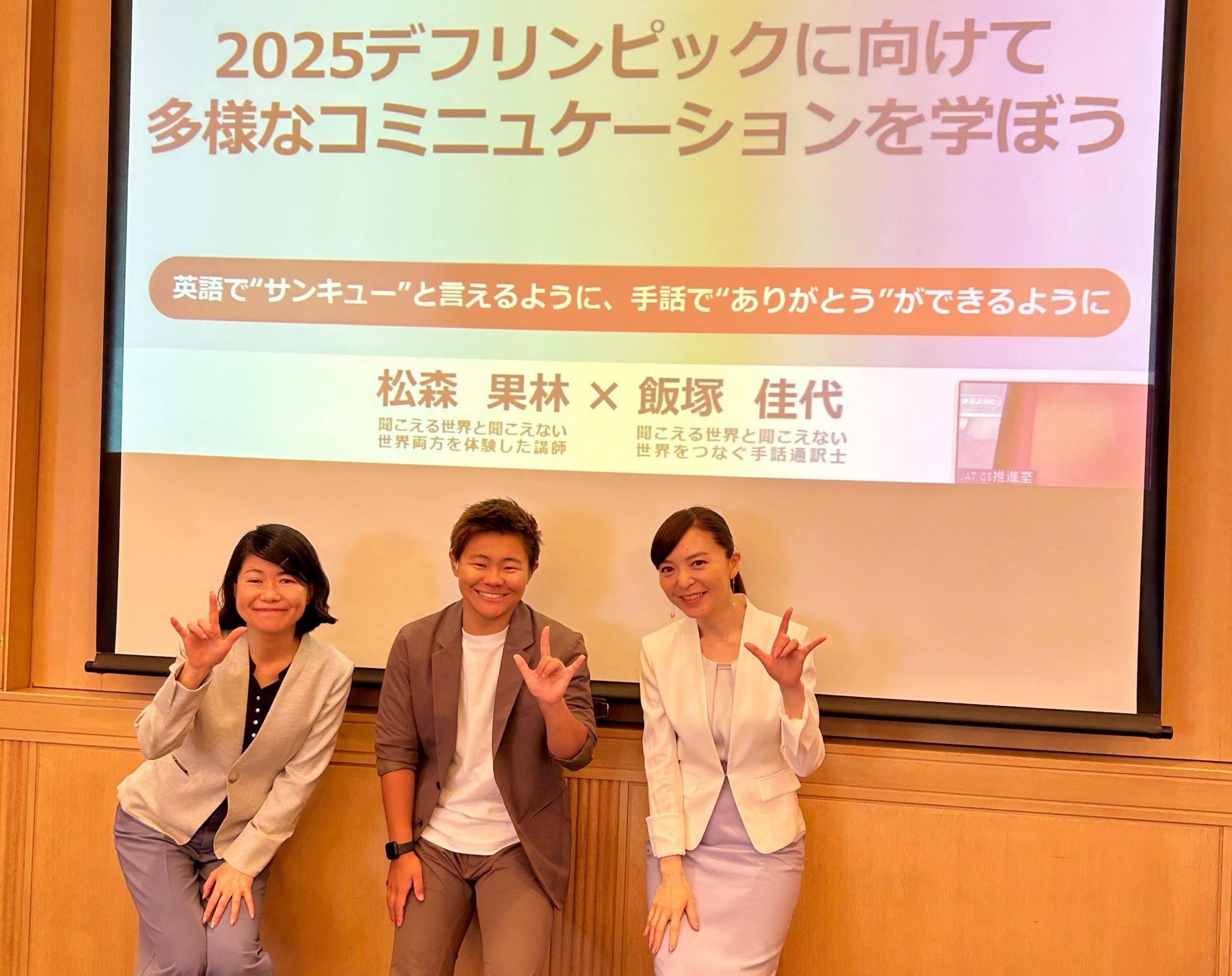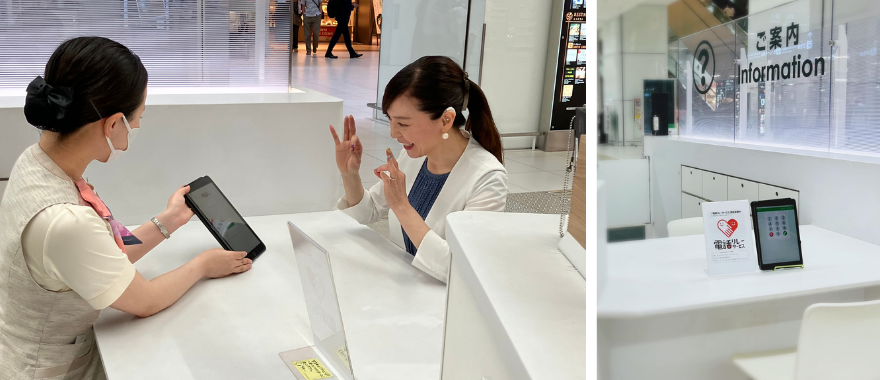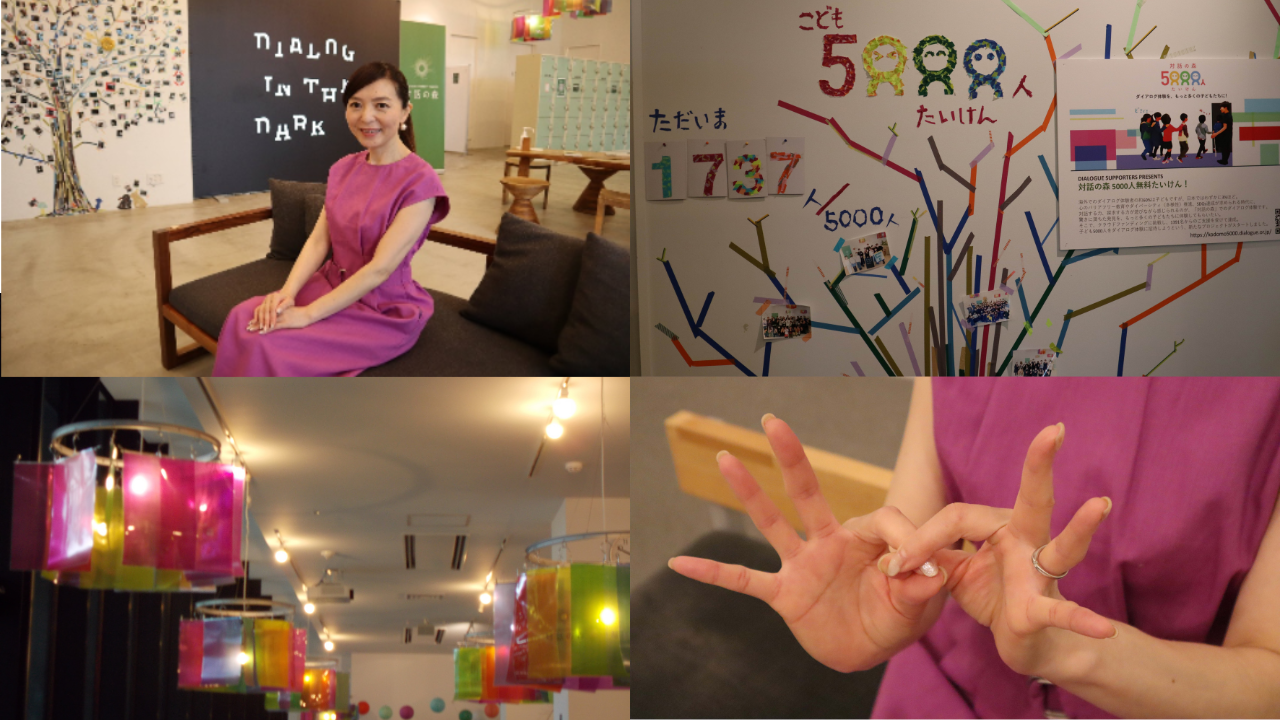Ryo Nakagawa (Designer) – “SUGOI (=Fantastic)” that will become a common language around the world at the World Athletics Championships Tokyo 25
2024.11.22
Connecting the audible and inaudible worlds
Universal Design Advisor

2023.08.18
Her voice was gentle and kind, and her bright eyes and smile drew me in from the first impression. We asked her about her diverse activities and her thoughts for the future as a “universal design advisor” who connects the hearing and non-hearing worlds, and as an “entertainer” who will bring excitement to the coming year 2025. We asked him about his diverse activities and his thoughts for the future.
Matsumori Universal design is the concept of products, designs, spaces, environments, and societies that are easy for all people to use, regardless of age, gender, culture, physical condition, or any other individuality or difference. My job is to provide appropriate guidance and advice from a professional standpoint in order to realize these goals. I am a deaf person who lost my hearing when I was in high school, and at the time I felt many barriers. I thought it was all my fault because I could not hear. I had been imprinted with the “medical model” idea that the cause was the individual.
But when I entered Tsukuba College of Technology (now Tsukuba University of Technology*1), I took a class titled “Proposal to Enjoy Tokyo Disneyland 10 Times More. #ff3399;”>“What can’t you enjoy because you can’t hear?” I took a class for two years that proposed a solution to this problem. And I also did a joint research project with Oriental Land Co. It was fun! It’s Disneyland every day (laughs).
I enjoyed working with my classmates on how to solve problems that arise from not being able to hear, such as “not being able to hear the voice announcements” and “not being able to grasp the content of the attractions. We put those suggestions together and gave a presentation in front of the vice president of Oriental Land and the employees. But on the day of the presentation, even though I had prepared well, I was so nervous that my mind went blank and I couldn’t say anything at all. I was standing still the whole time… I was like, “Oh no! What should I do?
Then it came out that I had heard about my first visit to Disneyland when I was in the third grade of elementary school. It was a fun dream world full of music and laughter, but when I went there in the third grade after I lost my hearing, I couldn’t understand what the people around me were saying, and I couldn’t hear the music. I felt the reality of not being able to hear and enjoy the music. After the event, I was depressed because I couldn’t talk about what I had prepared, but the teacher said to me, “That was really good! I was depressed because I couldn’t talk about what I had prepared. What? Why? I thought, “Your real-life experience really touched my heart.
At that time, I learned for the first time that “real experience is more persuasive than anything else. When you move people’s hearts, they feel like they want to think with you, and more and more people say, “Let’s do this together. As a result, many of our proposals were realized in various ways. Although I have had many complaints because I cannot hear, I was able to make proposals in a positive manner.
After that, I joined the Oriental Corporation.
After that, I worked for Oriental Land, where I worked in art and decorating, but after getting married and having a baby, I realized that not only in a company, but also in various places in society.I decided to become an independent Universal Design Advisor to be useful in various places in society, not only in companies. 
-What do you hope to accomplish in 2025, when the Deaflympics will be held in Tokyo for the first time,
and in the future?
Matsumori While I hope that 2025 will be an opportunity, one of the things I would like to do in the next 10 to 15 years is to “Spread the Deaflympics from airports” . strong>”I want to spread the Deaflympics from the airport”. I had the opportunity to be involved in the Universal Design Review Committee from the design stage of Haneda Airport’s international terminal (Terminal 3), and through that experience I have been in charge of planning and teaching training and seminars at Haneda Airport to promote understanding and treatment of the hearing impaired and sign language. At Japan Airport Building Corporation, which operates Haneda Airport, various employees are learning sign language. Awareness of the Deaflympics is still low. Therefore, I would like to promote the Deaflympics and sign language from the airport staff.
When the Deaflympics are held, deaf athletes from all over the world will visit the airport. Sign language is different in different countries. Sometimes Japanese sign language is not understood. It would be fun if we could communicate not only through spoken language and sign language, but also through facial expressions, body language, voice-recognition applications, and all other means and with our entire bodies. With this in mind, we held a seminar “Let’s learn diverse communication for the 2025 Deaflympics” for all airport staff members. We held a seminar. Then, we asked Sato Minato, a Deaf Athletics pole vaulter, to be the lecturer, and he shared his experience. He spoke about his experiences. Everyone who attended seemed to be very surprised and surprised to learn about a world they had never known before from Mr. Sato’s story.

Matsumori I think it has changed a lot! I have become more familiar with people who are deaf than ever before,” “I have become aware of people who are deaf or hard of hearing speaking in sign language,” “When a customer says, ‘I can’t hear you,’ I used to respond in a panic, but now I am able to respond calmly and with a smile. I am now able to respond calmly and with a smile when customers tell me they can’t hear me. Also, I have heard that people who were previously too shy to use sign language due to lack of confidence are now able to use various signs.
It took a long time, but we kept on building on it, even if it took a long time. I think this is very important.

Matsumori First of all, I think it’s “eye contact”. I think society will change just by having more people make eye contact. Making eye contact alone conveys a sense of security, and when a person makes eye contact with you, it shows that they want to talk to you.
Conversely, people who can hear each other can talk while looking down, and they look at their phones all the time on the train. But when the train gets a little crowded, just making eye contact and saying “please” with a smile can make people feel warm and fuzzy. I also think that many people get upset when they can’t communicate, but not being able to communicate is a normal part of everyday life for people who cannot hear It is a normal part of daily life for people who cannot hear. That is why I am glad that people are trying their best to communicate in such a society, and I think it would be good if people could enjoy the fact that they cannot communicate.
Matsumori The first is.“Minimum information security” and “environmental improvement”. For example, audio information in public facilities, including within athletic facilities, should be conveyed in real time using text and sign language. Japan’s ICT technology is evolving, and although each technology, such as the voice recognition function, is wonderful, the issue is that it has not yet become a system for society as a whole.
The second is “Entertainment for everyone”. I want everyone to be able to enjoy all forms of entertainment, including television, movies, stage and live performances, and traditional Japanese performing arts such as Kabuki. To achieve this, we need sign language and subtitles that go beyond information security and convey the world view of entertainment. .
Third, “Increase the number of places to meet. I know that the Tokyo 2020 Olympic and Paralympic Games represented a wide variety of diversity. But you end up just seeing them. I think there are some things you can’t understand unless you actually meet them. If we don’t meet, we will remain divided. It is only when we meet that we get involved and interact, and I believe that innovation will happen in places where these people meet.
Matsumori “Dialogue in Silence (*3)Dialogue in Silence is an entertainment experience that transcends language barriers in a world without sound. I supervised the planning of the first event in Japan in 2017, but I was told that it would be difficult in Japan. The reason is that “Dialogue in Silence” is an enjoyable experience that uses facial expressions and body language to find communication without using sounds, voices, or words. Many Japanese are rather uncomfortable with this.
But Noh masks, for example, change facial expressions, such as appearing to smile, depending on the angle of the light. I think this is possible only because Japan has such a sensitive culture. I was surprised to see how expressive Japanese people are. I was so surprised. People who were very nervous and had stiff expressions at first became more and more expressive, and even started to move their hands and feet. I call it “expansion of the body senses”.

And we can have fun with people who can’t hear, meet them on equal terms, and deepen our dialogue. When we engage in dialogue, preconceptions and stereotypes dissolve and the boundaries become blurred. Then we are able to talk to them as human beings and ask them questions that we would not normally ask, such as, “Why did you lose your hearing? That way, we can talk to them as human beings and ask them questions that we normally would not be able to ask. As we deepen our dialogue, barriers disappear, and when we meet people in society who are deaf or blind, our experiences here will be connected to them. In that sense, I think “encountering” is important.
We want children all over Japan to experience this entertainment, so we are holding projects such as inviting children for free. I hope that eventually it will become part of the curriculum at elementary and junior high schools throughout Japan, just as it has in other countries.
Currently, we are holding this event for a limited time at the Dialogue Diversity Museum “Dialogue Forest” in Tokyo. At this museum, in addition to people who cannot see or hear, there are also wheelchair users, people of short stature, LGBTQ people, and various other minorities who cannot be identified by outward appearances who act as cast members and meet with visiting guests to deepen dialogue through games and other activities. The questions include “Are you a minority? Or are you the majority? We sometimes ask the question, “Are you a minority or a majority? Many people think they are in the majority.
But I ask them, “What would happen if you were among those who only use sign language?”
But what happens if you join only those who use sign language? Then you become a minority. The terms minority and majority vary greatly depending on the environment and the state of society. In this way, the world expands when we increase our perspectives, and by gaining new perspectives through real experiences, we can eliminate our old assumptions and stereotypes.
We call it “social entertainment” to change society while having fun. This term is also what I myself aim for.
Matsumori “Be interested in the person in front of you or next to you right now”. If you only look at your phone, you will not be able to see what is going on around you. What kind of people are there next to me? “What are the people around me like?” “Oh, this person is a Deaflympic athlete,” “What is the Deaflympics? What is the difference between the Olympics, Paralympics and Deaflympics? I think the world will expand from there. I think the world will expand from there.
(END)
Karin Matsumori, born in Tokyo, Japan
A universal design advisor who connects the hearing and non-hearing worlds. She lost her hearing in her right ear in the fourth grade of elementary school and her left ear from junior high school through high school. His strength is that he cannot hear. From the standpoint of knowing both the world of hearing and the world of not hearing, she gives lectures, lectures at universities, writes, and gives advice on how everyone can enjoy themselves together, from public facilities to entertainment. Currently, she is mainly involved in the universal design review committee of Haneda and Narita airports, planning and teaching training programs on customer service sign language and diverse communication, etc. In 2017, she planned and supervised “Dialogue in Silence,” which originated in Germany and was held for the first time in Japan. In 2020, he opened the “Dialogue Diversity Museum: Forest of Dialogue” to promote understanding of the importance of dialogue and diversity, where he continues to work today.
〈Twitter〉
https://twitter.com/karinmatsumori
〈Facebook〉
https://www.facebook.com/MatsumoriKarin
*1: Located in Tsukuba City, Ibaraki Prefecture, it was the first national university corporation in Japan to make being visually impaired and hearing impaired a condition of admission.
*2: Interpreter operators use “sign language” or “sign language” to facilitate conversations between people with hearing or speech difficulties and people who can hear (people who are not hearing impaired, etc.)
: A service that enables an immediate two-way connection over the phone by interpreting “text” and “voice”. https://nftrs.or.jp/
*3: Entertainment that transcends language barriers in a world without sound. https://dis.dialogue.or.jp/
#Tokyo2025Deaflympics #Deaflympics #DeafSports #Cheering #SignLanguage #Airport #UniversalDesign #SocialEntertainment #Dialoguein Silence #Communication
2024.11.22

The World Athletics Championships will be held in Tokyo for the first time in 34 years since 1991. Ryo Nakagaw […]
2024.11.22
The World Athletics Championships will be held in Tokyo for the first time in 34 years since 1991. Ryo Nakagaw […]
2024.10.30

“Starbucks Coffee nonowa Kunitachi” opened in Tokyo’s Kunitachi city on June 2020, which is the first St […]
2024.10.30
“Starbucks Coffee nonowa Kunitachi” opened in Tokyo’s Kunitachi city on June 2020, which is the first St […]